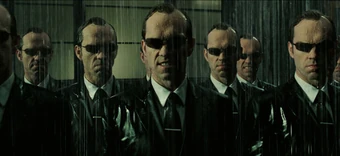As an intermission to all the COVID-19 news, let's take a moment to consider the beneficial role of viruses in our longevity.
In the movie The Matrix Agent Smith calls humanity a virus.
He might have been more accurate to say humanity wouldn't be the same without viruses.
Some Pieces of our Genome Came From a Virus
Or at least somewhere along the evolutionary path, we hacked virus tech for our own purposes. As we compare our DNA to viral DNA, we start to find some overlap in the genome.
The following functions appear to be viral in origin:
- Cognition - yes, how we think may be due to viruses. At least in part. Transmitting information between nerve cells requires sharing genetic materials - like passing a note in class. These passing and receiving elements are also found in a virus!
- Activating our immune system - many harmful viruses target immune cells, our bodies may use this signaling/seeking mechanism to help regulate immune responses
- Forming the placenta walls - viruses need to attach to hosts, and a placenta is a bit like a foreign body attaching to our body
- Digesting starch - this is just the helpful byproduct of producing proteins
Virus code also seems to be responsible for some cancers, so it's not all great.
Sources:
1. NIH, National Institute of General Medical Sciences (NIGMS). "Our complicated relationship with viruses." ScienceDaily. ScienceDaily, 28 November 2016. www.sciencedaily.com/releases/2016/11/161128151050.htm
2. Cell. ARTICLE| VOLUME 172, ISSUE 1-2, P262-274.E11, JANUARY 11, 2018. "Retrovirus-like Gag Protein Arc1 Binds RNA and Traffics across Synaptic Boutons." https://doi.org/10.1016/j.cell.2017.12.022
Gene Editing
Researchers are constantly look at the genetic and epigenetic factors that drive aging. A common test is to see what happens if a certain gene didn't exist. This type of test can be done through selection (finding organisms that are missing the gene). Or more recently, by directly snipping a gene out, or turning it off.
This technology (known as CRISPR) is the miracle byproduct of bacteria defending itself against virus. It stores the viral code like a mugshot, and if it encounters that code, it deletes it. The 'code' is the same kind of code we have in our DNA. So if we preload the stuff we want to snip out, viola, we have an organism with the gene of interest.
Beyond a research tool, this may also be the delivery mechanism for various genetic therapies targeting aging. David Sinclair's lab is already testing regeneration enhancements through viral vectors.
Regulating the MicroBiome with the Virome
We host a universe inside of us.
"The 10^13 human cells are outnumbered 10-fold by bacteria and 100-fold by viruses"
What are these itty bitty dudes up to? They are on our skin and in our gut, doing a lot!
Sometimes they are bouncers, getting rid of the trouble makers. Other times they may be like counselors, modifying behaviors by inserting new code.
Their role is still largely unknown, after all there are only 380 trillion viruses hanging around.
Sources:
2. John L Mokili, Forest Rohwer, Bas E Dutilh. "Metagenomics and future perspectives in virus discovery." Current Opinion in Virology. Volume 2, Issue 1, 2012. www.sciencedirect.com/science/article/pii/S1879625711001908
We Need them for Vaccines
It's hard to put an exact number on the contribution of vaccination to longevity. At the same time vaccines became popular, we also see improvements to sanitation, hygiene, education and technology. Nonetheless, there is no doubt that a large number of kids are no longer dying from certain diseases, like rotavirus, because of the availability of vaccines.
There are several ways to make a vaccine. A good overview is here, but the main takeaway is that we need a virus to kill a virus.
Conclusion
Viruses do make us sick (and that actually might be a good thing if it doesn't kill us). But they also may be involved in a bunch of other stuff, and may be shaping the future of humanity. A lot is unknown, but maybe one day, you'll be hoping to catch and spread a longevity virus.


